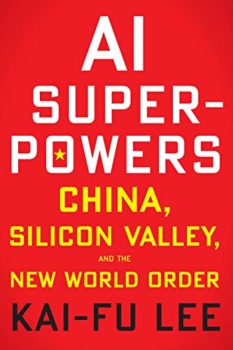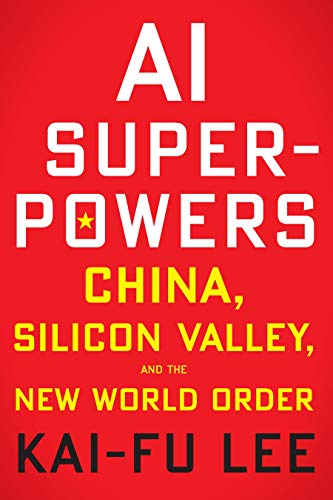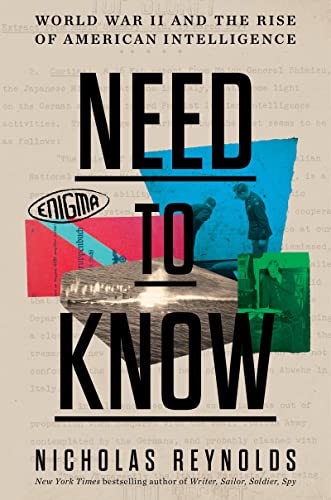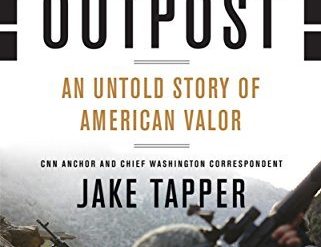
Google “books about artificial intelligence,” and you’ll find a slew of them. Amazon lists 286. Computer scientists, journalists, science fiction authors, and other observers have written on the topic, sometimes insightfully, sometimes not. I’ve read nearly two dozen of these books. But AI Superpowers, the latest one to land on my Kindle, is by far the best. Author Kai-Fu Lee isn’t just one of the most authoritative voices in the field. He’s also unusually insightful. And he writes well (although a collaborator may help account for that).
Estimated reading time: 6 minutes
A carefully balanced appraisal of AI
Dr. Lee’s thesis is straightforward. China is fast approaching parity with the United States “in the defining technology of the twenty-first century,” he contends. This rivalry is the focus of AI Superpowers. But the book ranges far beyond this narrow question into a carefully balanced appraisal of the field’s potential for good—and for harm. He is skeptical about the prospects for machine super-intelligence that doomsayers like Elon Musk and Stephen Hawking have decried. Lee doesn’t envision machines killing off the human race.
Taking the broad view, he asserts that “The AI world order will combine winner-take-all economics with an unprecedented concentration of wealth in the hands of a few companies in China and the United States. This, I believe, is the real underlying threat posed by artificial intelligence: tremendous social disorder and political collapse stemming from widespread unemployment and gaping inequality.” For example, “within ten to twenty years, I estimate we will be technically capable of automating 40 to 50 percent of jobs in the United States.”
AI Superpowers: China, Silicon Valley, and the New World Order by Kai-Fu Lee (2018) 272 pages ★★★★★
“Like the harnessing of electricity”
Much of contemporary commentary on AI dwells on the approach of Artificial General Intelligence (AGI). At that point, supposedly, machines will become so much smarter than humans that they may regard us as little more than pests. So goes the critics’ lament, at any rate. Dr. Lee believes AGI lies far in the future and may even prove to be impossible. But that’s not to say that AI’s impact will ultimately be anything but grave. “The dawn of AI in China,” he writes, “will be like the harnessing of electricity: a game-changer that supercharges industries across the board.” And, of course, that impact will be felt in the United States and everywhere else around the world as well: “the technology’s skill biases will generate a bifurcated job market that squeezes out the middle class.”
The best book about artificial intelligence
However, Dr. Lee is optimistic that the most severe consequences of AI’s wide deployment can be avoided. Certainly, millions of workers (most of them white-collar employees) will be displaced by automation. But there are a myriad of tasks that can only be performed by humans unless AGI should miraculously make an appearance. Take medicine, for example. Machines are rapidly gaining the ability to diagnose illness and prescribe medications better than any physician. Not long from now, it may be possible for doctors to forego memorizing all the minute details about illness and pharmacology and concentrate instead on relating to patients as human beings. This will open the possibility that much larger numbers of doctors can be put to work, since the intellectual demands will no longer be so great.
Far more compassionate caregivers
“As a result, society will be able to cost-effectively support far more compassionate caregivers than there are doctors, and we would receive far more and better care.” And there are innumerable other human services occupations that currently employ far too few people. (Think social work and education.) Also, “we will see entirely new service jobs that we can hardly imagine today. Explain to someone in the 1950s what a ‘life coach’ was and they’d probably think you were goofy.” Clearly, a shift toward human services and new forms of work isn’t a panacea. But it may go a long way toward mitigating the impact Dr. Lee foresees from AI. Nonetheless, public policy will need to shift as well, not just to provide the necessary incentives to move people into these new fields but to lessen the impact of growing economic inequality.
An alternative to a Universal Basic Income
Others have proposed either a Guaranteed Minimum Income or a Universal Basic Income (UBI) as the solution. Dr. Lee doesn’t agree. “I propose we explore the creation not of a UBI but of what I call a social investment stipend. The stipend would be a decent government salary given to those who invest their time and energy in those activities that promote a kind, compassionate, and creative society. These would include three broad categories: care work, community service, and education.” Lee might have mentioned the arts as well.
These fields would form the pillars of a new social contract, one that valued and rewarded socially beneficial activities in the same way we currently reward economically productive activities.” And society would pay the enormous cost of such a program out of the gargantuan profits Dr. Lee foresees accruing to the few AI giants that will dominate the world in the years to come.
About the author
Dr. Kai-Fu Lee is a Bejing-based Taiwanese venture capitalist, technology executive, and artificial intelligence expert. Before founding his venture capital fund, he was the president of Google China, and earlier had founded Microsoft Research China (now Microsoft Research Asia), which “trained the great majority of AI leaders in China, including CTOs or AI heads at Baidu, Tencent, Alibaba, Lenovo, Huawei and Haier.” (If you follow the news about technology in China, you’re probably familiar with all these companies.) He is one of the most widely read microbloggers in China, with more than 50 million followers, and has written seven bestselling books there.
For related reading
For another aspect of the competition between the US and China, see Chip War: The Fight for the World’s Most Critical Technologyby Chris Miller (How the US struggles to remain on top in computer technology).
You’ll find this book on The 40 best books of the decade. This is also one of the books I’ve included in my posts, Gaining a global perspective on the world around us and 10 best books about innovation.
I’ve also reviewed the author’s collaboration with a leading Chinese science fiction author: AI 2041 by Kai-Fu Lee and Chen Qiufan (A troubling but balanced view of artificial intelligence).
You’ll find more good reading on this topic at Two dozen good books about artificial intelligence and 5 best books about Silicon Valley.
You might also be interested in 20 good nonfiction books about the future (plus lots of science fiction) and 30 insightful books about China.
And you can always find my most popular reviews, and the most recent ones, on the Home Page.



























